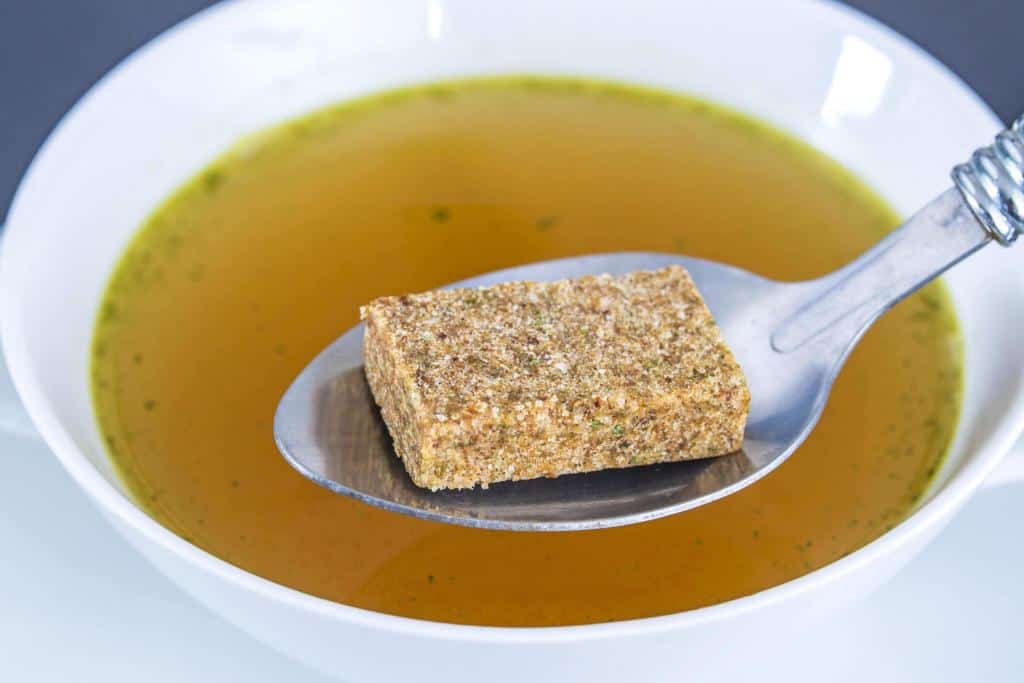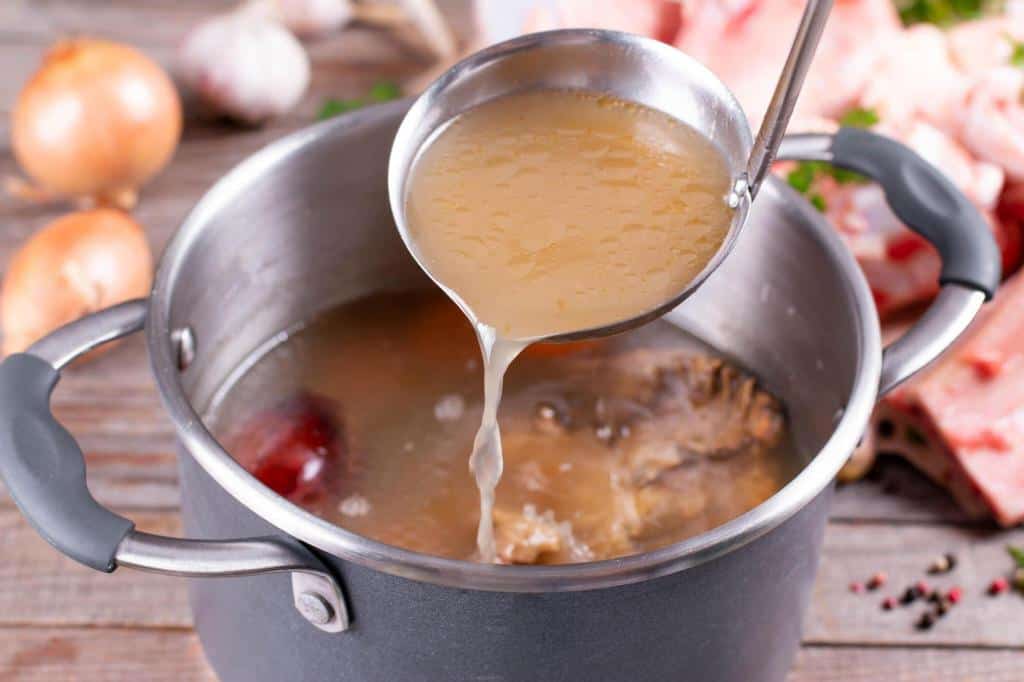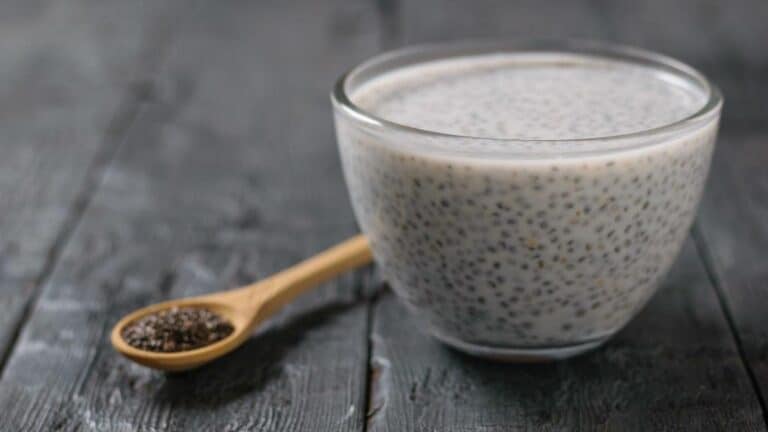What’s the Difference Between Bouillon Cubes and Stock?

When it comes to enhancing the flavor of your dishes, few ingredients are as versatile as bouillon cubes and stock. Both are common flavor bases in cooking. But, they differ greatly in their composition, preparation, and uses.
In this article, we’ll explain the differences between bouillon cubes and stock. We’ll help you understand when and how to use each for the best results in your kitchen.
Introduction to Bouillon Cubes and Stock

Bouillon cubes and stock are key ingredients in many kitchens. Each has unique flavors and uses. By dehydrating and compressing meat or vegetable stock with salt, seasonings, and occasionally MSG or other flavor enhancers, bouillon cubes are concentrated flavoring agents.
Stock is a liquid made by simmering meat, bones, vegetables, and aromatics in water for a long time. This creates a flavorful liquid that serves as a base for many dishes.
Both bouillon cubes and stock play pivotal roles in enhancing the taste and depth of various recipes. Bouillon cubes are handy. They add instant depth to dishes. This makes them popular in quick recipes or as a flavor booster in sauces, soups, and stews.
Stock has a subtle flavor. It forms the base for dishes. You can customize it to achieve the desired flavor. You may use bouillon cubes or stock. Understanding their traits and how to use them well can improve your cooking.
Bouillon Cubes vs. Stock: The Differences
1. Composition:
- Bouillon Cubes: By dehydrating and compressing meat or vegetable stock with salt, seasonings, and occasionally MSG or other flavor enhancers, bouillon cubes are concentrated flavoring agents.
- Stock: Stock, on the other hand, is a liquid made by simmering meat, bones, vegetables, and aromatics in water for an extended period. It is typically strained before use, resulting in a clear, flavorful liquid.
2. Sodium Content:
- Bouillon Cubes: Bouillon cubes often contain a high amount of sodium, which can contribute to the overall saltiness of a dish. You must watch your sodium intake. This is especially true if you’re using bouillon cubes in recipes that need added seasoning.
- Stock: Homemade stock allows you to control the sodium content and adjust the seasoning to suit your taste preferences. You can omit or reduce the amount of salt added during the cooking process, resulting in a healthier and more customizable option.
3. Flavor Intensity:
- Bouillon Cubes: Bouillon cubes are highly concentrated and pack a powerful flavor punch. They add instant depth to dishes. They make dishes rich. This makes them popular in quick recipes or as a flavor booster in sauces, soups, and stews.
- Stock: Stock has a more subtle flavor compared to bouillon cubes. It provides a basic flavor base for dishes. You can adjust the ingredients and cooking time to change the flavor.
4. Convenience and Storage:
- Bouillon Cubes: Bouillon cubes are convenient and shelf-stable. They are an excellent pantry staple for busy home cooks.
- Stock: Homemade stock takes more time and effort to make. But, it has the advantage of being customizable. It is also free from preservatives or additives. It can be stored in the refrigerator for a few days or frozen for longer-term storage.
5. Preparation Time and Effort:
- Bouillon Cubes: Bouillon cubes require minimal preparation time and effort since they are pre-made and ready to use. Simply dissolve the cube in hot water, and it’s ready to add to your recipe.
- Stock: Homemade stock, on the other hand, requires more time and effort to prepare. It involves simmering ingredients for several hours. This extracts the most flavor from the bones, vegetables, and aromatics. While homemade stock may be more time-consuming, many chefs and home cooks swear by its superior flavor and versatility.
How Many Chicken Bouillon Cubes Equal a Cup of Chicken Broth?
When substituting chicken bouillon cubes for chicken broth in recipes, you must know the right conversion ratio. Typically, you can use one chicken bouillon cube or one teaspoon of bouillon granules for every cup of chicken broth required in a recipe. To achieve this, simply dissolve the bouillon cube or granules in 8 ounces of boiling water.
This ratio ensures that you keep the desired flavor and salt level in your dish. It also provides the needed liquid. Keep in mind that bouillon cubes and granules are highly concentrated, so a little goes a long way in infusing your recipe with rich chicken flavor.
Using bouillon cubes or granules as a substitute for chicken broth offers convenience and versatility in the kitchen. You can use this simple substitution when making soups, stews, sauces, or gravies. It lets you adjust the flavor and seasoning of your dish to suit your taste.
How Much Water Should You Add to Chicken Broth?
When using store-bought chicken broth, it’s essential to strike the right balance of flavor and saltiness. To achieve this, a common recommendation is to dilute the chicken broth with water. A good starting point is to use a ratio of 2 parts broth to 1 part water, which translates to adding 2 cups of water for every 4 cups of broth.
This dilution helps reduce the overall saltiness of the broth while still retaining its savory flavor. However, keep in mind that individual taste preferences vary, so feel free to adjust the ratio based on your liking. Tasting the broth as you go allows you to fine-tune the flavor according to your preferences.
You can dilute store-bought chicken broth with water. This lets you adjust the flavor to fit your taste and your recipe’s needs. Whether you’re making soups, sauces, or stews, achieving the perfect balance of flavor is key to creating delicious and satisfying dishes.
| Read: Can You Reheat Chicken Soup Twice Without Making It Less Safe or Less Tasty? |
What Makes the Best-Tasting Chicken Broth?
Creating the best-tasting chicken broth involves several key factors that contribute to its flavor profile and overall quality. Firstly, starting with high-quality ingredients is paramount.
Using fresh chicken, preferably with bones and skin intact, along with a variety of aromatic vegetables such as onions, carrots, and celery, provides a solid foundation for a flavorful broth. These ingredients impart rich flavor and depth to the broth as they simmer together.
Next, the cooking method plays a crucial role in extracting maximum flavor from the ingredients. Simmering the chicken and vegetables slowly over low heat allows their flavors to meld and develop fully. Also, adding herbs and spices, such as bay leaves, peppercorns, and parsley, makes the broth more complex. They add extra layers of flavor.
Furthermore, proper seasoning is essential for achieving the best-tasting chicken broth as beverage. Adding just the right amount of salt enhances the flavors of the other ingredients without overpowering them. It’s essential to taste the broth as it cooks and adjust the seasoning accordingly to achieve the perfect balance of flavors.
Lastly, straining the broth removes impurities. It ensures a clear, clean final product. Follow these steps and pay attention to detail. You can create a delicious, aromatic chicken broth. It is the perfect base for soups, stews, sauces, and other culinary creations.
What’s the Best Tasting Chicken Broth?
The best-tasting chicken broth can vary by personal preference. But, the following brands have been highly recommended:
- O Organics: This broth is praised for its fatty flavor, reminiscent of chicken skin, making it perfect for wonton soup.
- Trader Joe’s Organic Free Range Chicken Broth: This broth is described as having a very fresh and chickeny flavor, with a reasonable amount of sodium.
- Imagine Free Range Chicken Broth: This broth is vegetal and has a lot of flavor, with a celery-forward taste.
- Kettle & Fire Chicken Broth: This broth is bright and vegetal, with less sodium than some other options.
- Pacific Foods Organic Bone Broth Chicken Unsalted: This broth is recommended for those seeking a lighter bone broth with greater ingredient transparency.
- Good & Gather Chicken Broth: This broth is praised for its robust chicken flavor and aroma, similar to a roasted chicken carcass.
- Bare Bones Organic Classic Chicken Bone Broth and Bare Bones Organic Rosemary & Lemon Chicken Bone Broth: These broths are organic and offer different flavor profiles, with the classic broth being savory and rich, and the rosemary & lemon broth being earthy and herbal.
- Zoup! Good, Really Good™ Chicken Broth: This broth has a concentrated chicken flavor and is praised for its drinkability on its own.
These broths are considered very tasty. They are some of the best chicken broths available. They offer a range of flavors and sodium levels. These suit different tastes and cooking needs.






